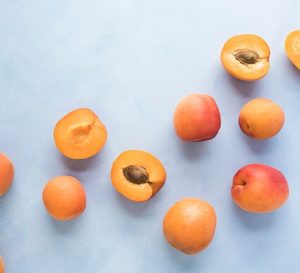Are dried apricots healthy?
Dried fruit contains much of the same nutritional benefits as fresh, but in a more concentrated form – for this reason, just a 30g serving counts as one of your five-a-day. Weight for weight, you’ll get more fibre, carotenoids and protective plant chemicals from the dried version of the fruit. It’s no surprise then that studies assessing the inclusion of dried fruits in the diet report an association with higher diet quality and a greater intake of many harder-to-get nutrients. In order to preserve the fruit’s original colour, appearance and extend its shelf life, many conventionally dried fruits have added sulphur dioxide. If you have a sensitivity to sulphites, check labels and buy organic dried apricots that are not preserved in this way.

Overall, are apricots good for you?
Apricots are a tasty addition to the diet and offer numerous health benefits, from supporting eye, skin and gut health, to protecting the heart, liver and immune system. Enjoy fresh during the summer season, and canned in juice or dried during the winter months.
1. Rich in protective plant compounds
Apricots contain a high concentration of active plant chemicals, including carotenoids, flavonoids and phenols. These compounds act as defence chemicals for the plant and play a similar protective role for us, supporting our immune system and heart, and potentially protecting us from certain forms of cancer, too.
2. May support vision and protect eyesight
The fruit’s deep yellow or sometimes orange flesh is indicative of a rich carotenoid content; the darker the colour, the richer that particular variety is likely to be. Carotenoids are plant-based sources of vitamin A, and play numerous roles in the body, including protecting our eyes and delaying the onset of age-related macular degeneration.
Lutein is one of the many carotenoids found in apricots, and plays a central role throughout our lifespan, supporting vision performance in the young, maintaining eye health in adulthood and supporting cognitive function in the elderly.
3. May support youthful skin
Because they are rich in carotenoids, apricots also play a beneficial role in skin health, including protecting against the ageing effects of environmental elements like UV light, pollution and smoking.
Studies evaluating the various types of carotenoids, including the colourless ones – phytoene and phytofluene – noted that a greater intake from fruits such as apricots and tomatoes may be associated with improvements in skin radiance, suppleness and elasticity.
4. May maintain digestive transit
Apricots are a rich source of dietary fibre that helps prevent constipation and maintain normal gastric transit. They also contain the sugar sorbitol, which is recommended for managing constipation when consumed through fruits such as apricots, peaches and plums.
5. May support gut health
Because apricots are rich in fibre, plant defence chemicals and sorbitol, they are likely to have an influence on our gut microbiota. While there is limited evidence to support these results in humans so far, studies suggest apricots, including in their dried form, may beneficially change the bacterial composition of the gut.
6. May support the cardiovascular system
Diet is an important factor when it comes to supporting the heart, and fruit may be one of the most important dietary components. Apricots are rich in protective plant compounds and antioxidant nutrients that are known to be effective in combatting heart disease. They also contribute soluble fibre that selectively lowers the so-called ‘bad’ LDL cholesterol that is considered a risk factor for heart disease.
7. May help manage high blood pressure
Apricots are a useful source of potassium, a mineral that acts as an electrolyte in the body and partners with sodium to regulate muscle contractions and fluid balance. For this reason, an adequate intake of potassium is important for preventing bloating and maintaining healthy blood pressure.
8. May protect the liver
Apricots may protect the liver, although much of the research to date has been from animal models. The evidence suggests that antioxidants in apricots, such as the carotenoids and vitamin content, may provide a protective effect against the damage of alcohol and other toxins.
9. May help in our fight against cancer
In a laboratory setting, extracts from apricot have been found to inhibit the growth of breast cancer cells, while other studies support their use for lung, colon and pancreatic cancer. However, larger clinical studies to support these effects in humans are needed.
10. May alleviate menopausal symptoms
Dried apricots are a source of lignans, plant compounds that have phyto-oestrogenic properties, potentially making them a useful ingredient for peri-menopausal women. Lignans also bolster our defences against chronic diseases, including cancer and heart disease.
